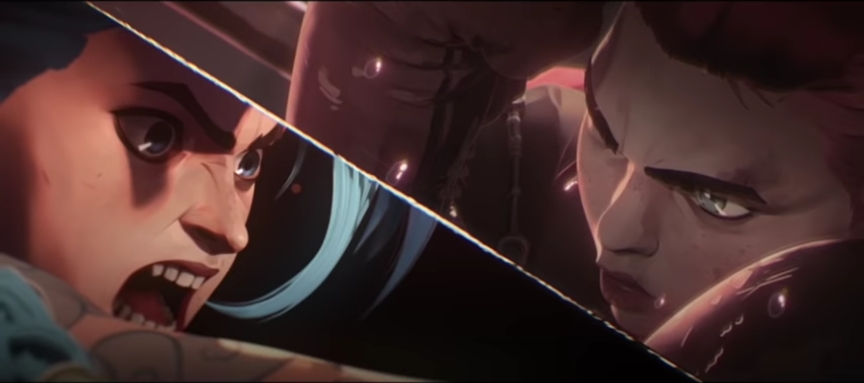Netflix’s ‘Arcane’ Is In A “League” Of Its Own
February 4, 2022
Netflix’s efforts to adapt video games for the tv screen has resulted in a mixed bag of both genre and quality. This includes classics like ‘Castlevania;’ triple-A titles like ‘The Witcher,’ and the world of strategy games like ‘Dota.’ They have been making their rounds in the video game world, with many more on the way.
Enter “Arcane,’ an animated series based off the hit multiplayer game ‘League of Legends.’ Seemingly out of nowhere, Arcane became a great success on Netflix, both for its layered, well-written animated plot, and its ability to kick the infamous “video game adaptation curse” to the curve.
So what makes ‘Arcane’ unique from its predecessors? What allows it to stand in a “league” of its own?
Set amid the schism between the opulent city of Piltover, and the squalid undercity of Zaun, the show follows two sisters as their paths intertwine with the social corruption around them.
Immediately, the thing that grabs the attention of the viewer is the visual style. Akin to a living, breathing painting, the show is gorgeous to behold. Fashioned by French-animation studio Fortiche, (whose works include music videos for both League of Legends and the pop band Gorillaz,) the world of ‘Arcane’ is filled with fluidity and style.
Blending 3D CGI with a hand-painted style, intercut by 2D animations, the design of the world feels like one big labor of love.
Every layer, every feature is teeming with beauty and craftsmanship. From the small little details of the environments, to the massive world around the story, to the extremely precise facial movements and body language of the characters.
Adding to this is the shot composition of the in-world camera, which highlights the small ambient moments that ground both the environment and the characters. This doesn’t just feel like a fantasy world—a canvas for the characters to move in. No, this world feels lived-in.
Showrunners Christian Linke and Alex Yee took the extra step in creating characters that felt believable and real. And it shows.
The story goes out of its way to show just how complicated life can be. Using the backdrop of the cities Zaun and Piltover respectively, the creators delve into the psychology of each character, showing the different perspectives on display.
No one character comes off as a stock hero or cliche villain. Rather, the show humanizes each character, and presents a person who feels like an actual human being with real motivations, passions and beliefs.
This dichotomy helps to turn each character into a foil of one another, displaying the contrast and conflicting mindsets that guide the characters. And the chemistry and interactions could have not been handled with more care and attention to detail.
Through these character relationships, the show delves into some pretty dark and very thematic elements. From the division caused through social conflict; to how childhood trauma affects relationships; to how political enterprise can corrupt an altruistic goal; to even how classism is born out of misunderstanding.
These ideas and concepts could’ve so easily been mishandled. Thankfully, they were cleverly woven into the show in a way that felt natural and mature. Amplifying this is the show’s music, which intersects between Alexander Temple and Alex Seaver’s orchestral soundtrack with artists such as Sting, Bea Miller and Imagine Dragons.
This further division in style only supports the divide of this world and also has the added effect of building the atmosphere in a way that is both kinetic and entertaining.
For its first outing, ‘Arcane’ has managed to walk the tightrope between good TV show, and great story. It successfully completes the herculean task of being both an amazing story with complex characters in a gorgeous fantasy world; and a video game adaptation that succeeds on all accounts.
Wrought with tragedy and action, the story doesn’t pull its punches. And with a groundbreaking style of animation, the magical world of ‘Arcane’ is looking bright. Because it didn’t succeed by copying the other adaptations before it.
No; its success was because of what it did DIFFERENT. And “what makes you different makes you strong.”




